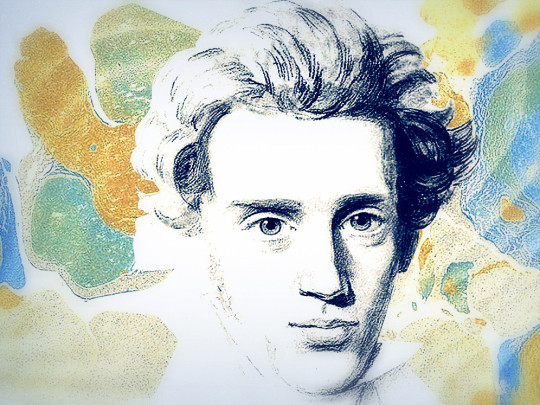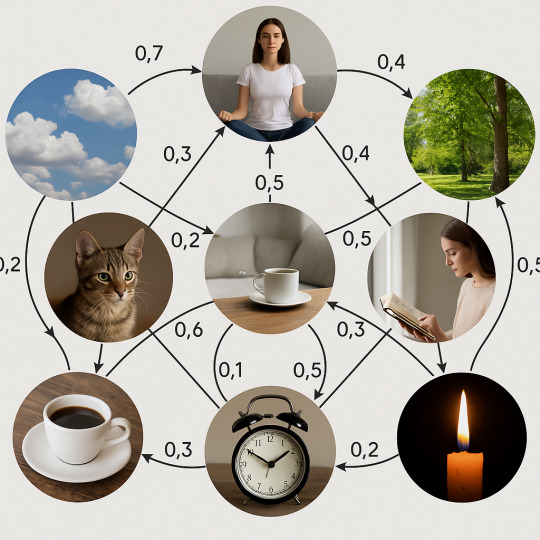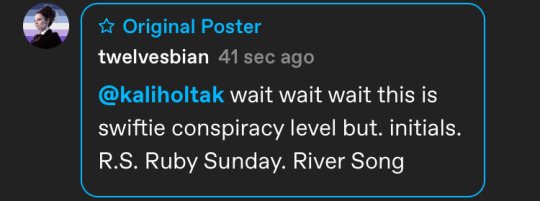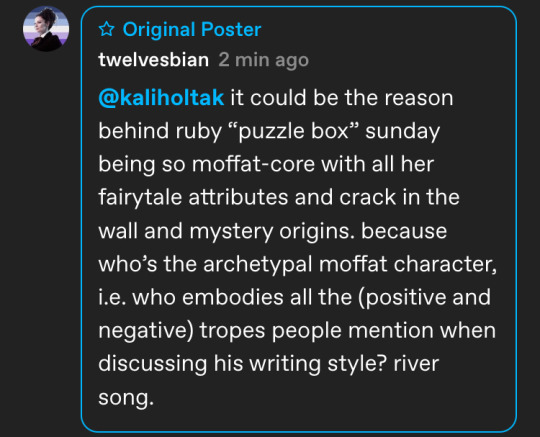#postscriptum
Explore tagged Tumblr posts
Text

«Todo pensamiento lógico se reproduce en lenguaje abstracto sub specie aeterni. Pensar de este modo la existencia equivale a omitir la dificultad, es decir, la dificultad de pensar lo eterno en proceso de devenir, algo que uno, sin duda, está obligado a hacer, puesto que el pensador mismo se halla en proceso de devenir. Síguese de esto que pensar abstractamente es más sencillo que existir, a menos que por existencia se entienda aquello que usualmente piensa la gente, algo como ser una especie de sujeto. Tenemos aquí nuevamente un ejemplo de cómo es que el más simple deber es también el más difícil. Se piensa que existir no es mucha cosa, mucho menos un arte. Es obvio que todos existimos; pero pensar abstractamente -eso ya es algo relevante. Pero existir verdaderamente, es decir, dejando que la conciencia penetre en la propia existencia, siendo simultáneamente eterno, incluso más allá, por así decirlo, y no obstante presente en ella en un proceso de devenir -eso es lo verdaderamente difícil.»
Søren Kierkegaard: Postscriptum no científico a las Migajas Filosóficas. Universidad Iberoamericana, A. C., págs. 309-310. México, 2008.
TGO
@bocadosdefilosofia
@dias-de-la-ira-1
#søren kierkegaard#kierkegaard#søren aabye kierkegaard#post-scriptum#postscriptum#existencia#devenir#pensamiento lógico#lenguaje abstracto#existir#eterno#eternidad#filosofía existencial#filosofía contemporánea#anti-hegelianismo#teo gómez otero
8 notes
·
View notes
Text
> new series release (space babies) coincided with the uk seeing the northern lights for the first time in years
> the devil’s chord coincided with paul mccartney’s long-missing hofner bass guitar being found, by a doctor who fan no less
> boom coincided with an actual meteor crash
> 73 yards is coinciding with a rise in bizarre supposedly-occult animal sacrifice rituals in britain (the folk horror part) and rishi sunak finally calling a general election (the political drama part)
> hypothesis: russell t davies has somehow managed to tune in to the universe’s divine frequency ??
> conclusion: messing with the forces of fate, cause&effect and coincidence, even if it’s for the pop culture franchise you’re showrunning, actually turns it into an egregore, but only if it’s been going for long enough (sixty fucking years to the dot) and watched by enough people (tens of millions). which it has
> ergo, postscriptum: television magick is real and is being unintentionally performed by the creators + audience of the world’s silliest science fiction show
> /jk. unless?
#p.p.s. i am not insane i do not have psychosis. what i do have is imagination!#if you say oMg oP wHaT arE yOu SmOkInG you’re getting blocked#have an ounce of whimsy. entertain the possibility that not everything is explicable#i could be into actually harmful conspiracy theories; like lizard people (antisemitic) or anti-vax. think about that#doctor who meta#doctor who#dw#dw meta#doctor who series 14#russell t davies#fifteen#fifteenth doctor#ncuti gatwa#nuwho#ruby sunday#the church on ruby road#73 yards#space babies#boom#the devil’s chord#esquivalience#pop culture magic#kitty.txt#👁️
1K notes
·
View notes
Text
Ever just want to say your last piece (peace) of mind to every past tense of people that:
"Oye!!, Thank fuck that our language was never a match even when I tried so hard to understand it but I suppose good riddance that it must have been meant to be for me to never fully grasp those toxic despair & hollowed longing that when another healthy dialect spoken unexpectedly, had instantly fit my soul like a glove & it feels so right that it is always full & never pretentiously trying to mould me in any way — Thank fuck that you aint it, so the right it can find me instead & Lord I cannot be so grateful enough to be found in my worse rotting heart that her existence itself was so healing & loving to a point which my unsaved self was retrievable in the end — So Thank fuck, good riddance in an endless repetition & maybe your lesson is to remain miserable in that same vibration & frequency you continuously willingly to put yourself through but oh look at that, unfortunately I can see it now that this language of yours is nowhere near my parlance because the one I am fluent in can actually swallow the darkness itself, for her light is Godlike & that’s a Thank fuck of a mother tongue you will never ever going to compete with —"
Postscriptum: Closure doesn't always have to carry the energy of peace, it can be brute & brutal with honesty & as long as it gives you the peace you acquire then that's all you needed to move forward with -
D C de Oliveira | Fiel, Closed for Sure! | July 21 2023 | Friday 12.10am
1K notes
·
View notes
Text


Horst Janssen, Postscriptum für Nao
154 notes
·
View notes
Text

(ooc) interesting fact: watermelons in totk/botw seem to be closer to older varieties of watermelons, probably wild watermelons (which would make sense since in hyrule melons are foraged, not cultivated) or their less modified (compared to modern ones) domesticated versions. this is the type of watermelon found on Renaissance and baroque (up until about 17th century (included)?) paintings

this variety is almost impossible to stumble across today although some gardeners manage to grow melons with patterns (usually on accident) (image found on Reddit)

also kind of a postscriptum: the swirls usually become dark red even in regular modern watermelons when the fruit (i remembered the word fruit by the end of this post) starts to rot, which would make sense here, since this rubbish dump is basically a midden. they're most likely rotting


12 notes
·
View notes
Photo

By Duet Postscriptum on Stocksy
55 notes
·
View notes
Text
C'mon, hop on my lap!
Hi! You may call me Kate or Mommy. This pinned post is as fickle as the wind.
About me
{Late 20s
{Trans
{Lesbian
{Femme4Femme (mostly)
What keeps me busy
{Magic the gathering
{General nerdy things
{Hiking
{Your tits.
Postscriptum
{Asks open. Please show off for mommy, maybe I'll put you on the fridge.
{Minors, Zionists, fascists etc. DNI.
8 notes
·
View notes
Text
Reality as a net of experience

A Markov transition graph is a way of modeling how something moves from one state to another, step by step, with certain probabilities. Each state is a node, and the arrows—or edges—between nodes are weighted to indicate how likely the transition is. The weights are probabilities: they tell you how likely it is to go from one node to another in the next step. Importantly, what happens next depends only on where you are now—not on how you got there.
Now imagine that each node of this graph is one experience—one coherent scene of consciousness, consisting of sound, color, mood, thought, bodily feeling, all momentarily arising together. There is no hidden world behind them. No physical matter. No “things” at all. Just experiences, arising one after the other, connected like pearls on a thread.
In this model, you don’t travel through a physical world. You travel through the graph of experience itself. One moment of experience leads probabilistically to another, depending on past patterns, habits, tendencies. But crucially, there's nothing outside this graph producing the experiences. There’s no hidden stage behind the play. The play is all there is.
This might sound strange at first, especially from a Western perspective shaped by philosophers like Kant. Kant said we only ever have access to phenomena—what appears to us—but that these phenomena are structured by something deeper, something we can never know directly: the noumenon, or “thing-in-itself.” In other words, there’s a secret world behind appearances, which somehow causes or sustains them.
But the idea of the experience graph turns that upside down. It asks: what if we stop believing in a hidden layer behind experience? What if experiences don’t need to be grounded in a noumenon? What if they’re not appearances of something, but just appearances—events in their own right?
This idea resonates deeply with Zen Buddhism. Zen doesn’t affirm a hidden reality behind the world of appearances. It also doesn’t deny the world. Instead, it radically accepts each moment just as it is, without attaching any ontological baggage to it. When a sound arises, Zen doesn't immediately ask, “What caused this sound?” or “What object is this sound coming from?” It simply sees the sound as just this moment’s reality—empty of any essence, and yet fully vivid.
The experience graph doesn’t require a traveler either. There is no fixed self moving through it. Rather, the “self” is just the path itself—a sequence of interconnected experiences that, together, give rise to the illusion of a continuous identity. In this way, the model also reflects the Buddhist idea of anattā, or non-self. There’s no one “inside” having the experiences—just the flow.
The transitions between experiences don’t need laws of physics or external causes. They can be modeled as probabilities, or habits. In the same way that we might expect morning to follow night, or a response to follow a question, certain experiences tend to lead to others. No need to postulate a solid world behind them.
Even memory fits into this. A memory is not a portal to a past thing—it’s just another kind of experience, one that feels like a trace of something before. It arises here and now, with the flavor of “having been.” In the graph, it’s a node with connections pointing backward. But all of it happens within the graph itself—no external timeline required.
This view invites a radical simplicity. There is no need for a world of matter, or even a soul to perceive it. There is just the stream of experience, moving through a pre-existing graph of possibilities—patterned, unfolding, and vivid. No ground, no behind, no scaffolding. Just this. And then this. And then this.
***
Postscriptum: On Internal State and the Possibility of Learning
One might still wonder how genuine learning can occur in a model where the graph of experiences is fixed and pre-existing. If each moment is simply a probabilistic transition to the next, how can there be growth, transformation, or the accumulation of knowledge? A compelling answer lies in introducing an internal state—a hidden vector that evolves along with the visible stream of experiences.
This internal state does not belong to a stable self, nor is it attached to the nodes of the graph. Rather, it co-evolves with the path taken. It is a kind of traveling memory: a compressed echo of the past that shapes what can happen next. The agent, then, is not a thing or a soul, but the path itself plus this dynamic memory trace. There is no entity apart from the unfolding, yet the unfolding carries its own inertia.
Learning, in this view, is not the creation of new nodes or the rewriting of the graph. It is the gradual modulation of the path’s internal state, which in turn shifts the probabilities of future transitions. Like a shadow cast forward by previous steps, the internal state subtly influences what is likely to come next—without ever becoming a fixed identity.
2 notes
·
View notes
Text

⏩ Cover and blurb of the new book from RC Books — “Psi: Postscriptum”, approved and blessed for a bright future by the screenwriter of the original novel, Alexander Jester
Power is merciless, especially to those who tried to overthrow it.
Ivo Martin’s plan has failed, the Vicar has won, and Lou Reed, miraculously escaping arrest and death, is left completely alone.
Disarmed, she watches the execution of Irma, Tom… and Jonas, who was not only her friend but the man she loved. Now, revenge is the sole purpose of her existence.
However, Lou has no idea that Jonas is actually alive and, against his will, drawn into the planning of a new revolution. They will meet again, to challenge a system where truth is more dangerous than any weapon, and love is the only thing that cannot be taken away.
6 notes
·
View notes
Text
When I regularly attended an evangelical Lutheran church, the beverage they served afterwards was, to the best of my knowledge, brewed by:
1. Boiling a large quantity of sawdust in greywater,
2. Catching the spit that ran from Pastor B—'s cornball homilies as he practiced them in the mirror.
At the unitarian universalist church I have been to, the coffee is quite good—I could believe the sinful touch of a coffee bean was somehow involved in its making.
By extrapolation from the property of "loosey-goosey theology engenders good coffee," I conclude that the coffee in the Terra Ignota universe must be orgasmic
---
Postscriptum: my girlfriend has been reading TI to me and isn't finished. Please don't tell me spoilers. I was going to wait to publish this post until she'd finished but Tumblr is probably going to die before then
5 notes
·
View notes
Text
slight case of derangement today! you’ve been warned.
anyway has anybody considered… what if ruby sunday turns out to be river’s daughter from the 24 years she spent on darilium with twelve. plenty long enough to begin to raise a child. river could have wiped the doctor’s mind of all memory of their daughter for some kind of safety reason, likely to protect ruby (not that it works for long). would explain her tabula rasa heritage, and, more importantly, act as the obvious reasoning behind the bbc adamantly refusing to reveal the name of the leaked future companion played by varada sethu after millie leaves post-s1/14: it would be a massive spoiler for the series finale since she’s a regenerated ruby, 3/4 gallifreyan (or 1/2 weird time vortex augmented human?? one heart or two for ruby then? what even is river species-wise? many questions zero answers) another clue backing this concept up is the nature of the ruby/doctor relationship being completely non-romantic from what we’ve seen, with the doctor probably finding a male love interest in s1. just imagine a final two-parter — the doctor and ruby are facing some world-ending stakes, the universe is in peril, ruby ends up fatally wounded and… her hands start buzzing with a familiar golden glow
one more tidbit in corroboration: in a recent panel at some con (i can’t remember the video link now but if someone asks for receipts i will find it) alex kingston was quoted saying that river’s journey “may not be over just yet”. of course this could mean big finish or it could mean nothing at all but what if it hints at her showing up in a flashback sequence. what if she’s behind the black cloak, carrying baby ruby to the church? what if the doctor didn’t approach the hooded woman because of a subconscious recognition…
now, disclaimer so none of you start weird discourse for whatever reason, of course this could end up being a completely idiotic theory that’s way off the mark. or it could accidentally turn out to be spot on. imagine if i got it right. what would be the odds. would i feel vindicated or disappointed?
p.s. adding stuff i initially left in comments because it completes the post


post-postscriptum: (mrs) flood… river… pond…
#river song#doctor who#ruby sunday#dw#the church on ruby road#the husbands of river song#fifteenth doctor#twelfth doctor#peter capaldi#ncuti gatwa#alex kingston#millie gibson#varada sethu#doctor who theories#doctor who theory#rtd2#russell t davies#fifteen#twelve#mrs flood#steven moffat
161 notes
·
View notes
Note
Hello there Ichabod.
With the Halloween season upon us, I was wondering: what are your plans to celebrate this spooky time of year? Will you be out drinking with all your friends/teammates? Or spending a nice evening in with Abbie and little Grace?
Good evening!
Abbie and I spend considerably less time Out Drinking with friends since our darling has come into our lives. At first, purely from Utter Exhaustion, and later from.... No, I must admit, still utter exhaustion.
We shall be taking Grace Trick-o-Treating in the afternoon (Abbie complains that it Isn't The Same trick-o-treating in daylight as it was when She Was A Child and they went out at Night), and in the evening we shall probably Order Pizza, put Gracie to bed ('Say good night, Gracie') and watch a Scary Movie. By which I mean, The Lost Skeleton of Cadavra, which Abbie has been Threatening to make me watch for a Year. I am, indeed, Quaking at the thought.
Yr servant,
Ichabod Crane
Postscriptum: I saw a Plastic Tombstone in a Craft Store last week with my Name upon it. It was, as Abbie would say, Surreal.
5 notes
·
View notes
Text

Postscriptum - Hans Christiansen, 1897
#19th century#19th century art#art#jugend magazine#vintage illustration#art nouveau#jugendstil#circa 1897#hans christiansen#Yellow
2 notes
·
View notes
Text
Postscriptum

Как жаль, что тем, чем стало для меня
твоё существование, не стало
моё существование для тебя.
...В который раз на старом пустыре
я запускаю в проволочный космос
свой медный грош, увенчанный гербом,
в отчаянной попытке возвеличить
момент соединения... Увы,
тому, кто не умеет заменить
собой весь мир, обычно остаётся
крутить щербатый телефонный диск,
как стол на спиритическом сеансе,
покуда призрак не ответит эхом
последним воплям зуммера в ночи.
- Иосиф Бродский
1967
0 notes
Text
postscriptum to the previous post
and on top of that my friend got better in three days can you believe it?
i’m not surprised tbh bc i was weak after tournament i took part in the day before. so my immune system was worse than usually. that tournament wasn’t worth it i got 7th place so i got my price and everything but i feel like i didn’t do my best i wasn’t stressed at all before and in the middle of the first fight it strucked me and i got really like REALLY stressed i wanted to cry all the time
it hurts bc lately i was really good in the club winning even with the ones that are better than me and now i am still stressed even in causal fights i literally gave up on last practice i went to bc i couldn’t bring myself to fight
#everyday life#life blogging#personal blog#epee fencing#fencing#sport club#stress#anxitey#tournament#practice#sports
0 notes
Text
Michel Foucault, al igual que Deleuze, se aparta de las concepciones tradicionales del marxismo, particularmente en lo que respecta a la noción de la clase obrera y el enfoque en las luchas de clases como un eje central para la transformación social. Su perspectiva no es diferente a la de Deleuze; no se focaliza tanto en una crítica explícita al concepto de clase obrera, sino que examina las relaciones de poder en términos más amplios, centrándose en la microfísica del poder y las formas de disciplinamiento en la sociedad:
* el poder no es algo que se pueda reducir a una lucha entre una clase dominante y una clase subordinada. En sus obras, como "Vigilar y castigar" (1975) y "Historia de la sexualidad" (1976), Foucault introduce la idea de una red dispersa de relaciones de poder que no se limitan a los grandes conflictos entre clases, sino que permea todos los niveles de la sociedad. El poder no es únicamente algo que emana de los grupos económicos o del Estado, sino que se encuentra en las prácticas cotidianas, las instituciones, las disciplinas y las normativas que moldean los cuerpos y las mentes de los individuos.
* en su análisis del poder, Foucault introduce el concepto de "biopoder", que se refiere a las formas de control social que afectan la vida misma de los individuos, particularmente en el ámbito de la salud, la sexualidad y la natalidad. Esta forma de poder no está centrada exclusivamente en la propiedad o la explotación del trabajo, sino que implica un control más sutil sobre los cuerpos y las vidas de los individuos, algo que va más allá de las luchas tradicionales entre clases. El biopoder afecta a todos los sectores de la población, no solo a los trabajadores, lo que cuestiona la idea de una clase obrera homogénea como el sujeto de la resistencia.
* analiza cómo las instituciones (como la escuela, la prisión, el hospital, etc.) producen y distribuyen el conocimiento de manera que legitiman las estructuras de poder. Este conocimiento no es neutral, sino que forma parte de un régimen de poder que moldea a los sujetos de manera que estos no siempre son conscientes de su subordinación. Así, la noción de "clase obrera" o cualquier otro sujeto de resistencia debe ser entendida también en términos de cómo estas identidades son producidas y mantenidas por el saber y las instituciones.
Foucault no rechaza la posibilidad de resistencia, pero la entiende como dispersa, fragmentada y variable, sin reducirla a una clase obrera unificada (lo cual hoy día es una fantasía, pues la gente se percibe consumidora antes que proletaria). Para él, las luchas de poder están en todas partes, y la resistencia puede tomar muchas formas y ser practicada por distintos sujetos en diferentes contextos, ...hay ejemplos notorios como el genocidio occidental contra los mapuches, o también las prácticas de vida gitanas:
youtube
Deleuze toma las ideas de Michel Foucault sobre el poder, la disciplina y las instituciones, y las desarrolla en su concepto de sociedades de control, el cual introduce en su famoso texto "Postscriptum sobre las sociedades de control" (1990). Mientras que Foucault describe en sus trabajos cómo el poder se ejerce a través de instituciones específicas (como la prisión, la escuela o el hospital), Deleuze extiende esta visión a otros detalles y propone que, en las sociedades contemporáneas, las formas de poder y control se han desplazado hacia nuevas formas más difusas y menos visibles, que funcionan fuera de las instituciones tradicionales y se infiltran en todos los aspectos de la vida social:
* inspirándose en las ideas de Foucault, observa que en las sociedades contemporáneas el poder ya no se ejerce de la misma manera. En lugar de estar centrado en instituciones cerradas, el poder de control es disperso, fluido y descentralizado. Según Deleuze, en las sociedades modernas, las instituciones disciplinarias han sido reemplazadas por mecanismos de control más difusos, que operan a través de tecnologías de la información, sistemas financieros, mercados y otras estructuras sociales que no se limitan a un espacio o tiempo determinado. El control se ha desplazado a nuevas formas que operan a través de redes, en las que los individuos ya no son encerrados en instituciones, sino que son constantemente moldeados, evaluados y vigilados en cualquier momento y en cualquier lugar.
* en las sociedades de control el poder ya no actúa de forma tan rígida o estática. El control se ejerce de manera continua y flexible. En lugar de una vigilancia que se limita a las instituciones físicas, en las sociedades de control el poder se internaliza en las personas, que se encuentran constantemente en un estado de evaluación y medida, como si estuvieran bajo una constante "vigilancia". Por ejemplo, el poder se ejerce a través de la información que generamos constantemente en las redes sociales, en los mercados, en las transacciones económicas, y en las estructuras laborales que controlan nuestra productividad mediante el rendimiento constante. El poder no se limita al control de lo que hacemos, sino también de lo que somos, al identificar nuestras preferencias, deseos y comportamientos., el control ya no está limitado a un espacio físico, sino que atraviesa todos los aspectos de la vida cotidiana, desde la educación hasta el trabajo, pasando por las relaciones interpersonales y las decisiones de consumo.
Foucault argumenta que el poder en las sociedades disciplinarias tiende a “normalizar” a los individuos, es decir, a producir sujetos que se ajustan a un modelo de comportamiento estándar. En la sociedad de control, Deleuze lleva esto más allá, sosteniendo que el control no busca meramente normalizar, sino modular cuerpos más que sólo individualizar. Los sujetos ya no se enfrentan a una norma colectiva, sino que son controlados de manera personalizada, mediante sistemas de puntuación, calificación y categorización que se aplican a cada uno de nosotros. Estos sistemas de control dependen de las tecnologías digitales para realizar perfiles cada vez más precisos, que permiten ajustar las formas de control a cada individuo. Un ejemplo claro de esto sería la manera en que las empresas o gobiernos rastrean nuestras acciones online para ofrecer productos, servicios y vigilancia adaptados a nuestras preferencias y comportamientos. Si el ejercicio de poder ha cambiado desde los primeros sindicatos, las estrategias para enfrentar al sistema no pueden seguir siendo las mismas: yo veo con claridad en Argentina más que en otras partes, como el sindicato ya no es criminal, sino otro engranaje más del ejercicio de poder de los dispositivos que controlan al trabajador: > Así como no puedo prescindir de un celular si quiero trabajar o estudiar, no puedo prescindir de los sindicatos: no porque sean buenos, sino porque son engranajes del sistema que en algún momento representaron alguna fuga, pero, actualmente asimilados a los mecanismos de control capitalista, son sólo parte de la funcionalidad y como tales, evitan que otras formas de resistir sean posibles (eso no significa que sean malos tampoco, pues la funcionalidad capitalista poco tiene que ver con el mal y el bien; pero sí están implicados en ser necesarios para sostener el tejido capitalista); algo que puede verse no sólo en el sindicato como institución sino en los mismos comunistas o personas afines a 'querer alguna revolución'... detestan la creatividad que nos pueda encaminar a nuevas estrategias de resistencia, están acomodados a todo lo que el poder ya conoce, se descansan en el sesgo de "se trata de tomar consciencia" porque así ya tienen el cielo ganado de antemano, en la nostalgia de lo que alguna vez pudo ser pero no fue "pero debe haber salido mal porque tal y tal error, pero igual de todos modos hay que insistir en las mismas estrategias y ya".
0 notes